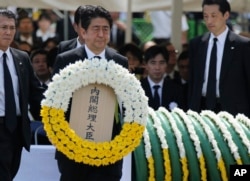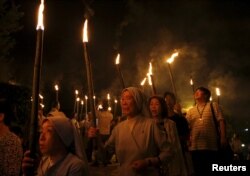Japanese Prime Minister Shinzo Abe on Sunday marked the 70th anniversary of the atomic bombing of Nagasaki by renewing his commitment to a nuclear weapons-free Japan, following criticism for not making the same pledge on the anniversary of the Hiroshima bombing last week.
"As the only nation in the world to have suffered a war-time nuclear attack, I have renewed my resolve to play a leading role in pursuing a world without nuclear weapons and maintain the three non-nuclear principles," Abe said in Nagasaki Peace Park.
The "three non-nuclear principles" are Japan's long-standing policy of not possessing or producing nuclear arms and not letting others bring them into the country.
Japan's defense minister triggered a new row over controversial security legislation on Wednesday when he said the bills under consideration by parliament would not rule out the military transporting the nuclear weapons of foreign forces.
Abe's cabinet adopted a resolution last year reinterpreting the pacifist constitution, drafted by Americans after World War II, to let Japan exercise collective self-defense, or defend an ally under attack.
Unpopular bills
The unpopular bills have already passed the lower house and Abe's ruling bloc has a majority in the upper house as well. But surveys show a majority of voters are opposed to what would be a significant shift in Japan's defense policy.
Japanese media reported that Abe will not visit Tokyo's controversial Yasukuni shrine for the war dead on Aug. 15, which marks the 70th anniversary of Japan's surrender to the Allies in World War II.
Abe is a regular visitor to the shrine and his appearances often spark ire from Asian neighbors such as China and South Korea which came under Japanese occupation.
Even if the premier stays away from Yasukuni, he may still come under scrutiny if he omits an apology in a statement expected to be released later this week marking the 70th anniversary of Japan's defeat.
Abe has said the statement will express "remorse" for Japan's war-time actions but domestic media reported over the weekend that the word "apology" will not be included.
Abe's remarks are being closely watched by China and South Korea, where bitter memories of Japan's wartime occupation and colonization run deep, and by Tokyo's close ally Washington.
Protesters
Hundreds of residents of Japanese city Nagasaki on Sunday held a peace rally to protest Prime Minister Shinzo Abe's security bills as the city marked the 70th anniversary of its atomic bombing.
Meanwhile, protesters, including relatives of atomic bombing victims, said Abe's security bills will jeopardize the country's pacifist constitution that has safeguarded peace for 70 years.
"If they overturn the ninth article of the constitution, then Japan will be able to wage aggression war again and kill innocent people. We should never let this happen," said a protester.
"If Abe's security bills are approved, then he can do whatever he wants. Many people in Japan oppose his security bills, even the legislative experts say his bills are against constitution, but he still insists to push for its approval, I feel angry and agitated for that," said another protester.
"A lot of Japanese have been disturbed by the Abe administration. Everybody knows that Japan's choice of pacifism in post-war era was right. With this mindset I came to Nagasaki today to mark the atomic bombing," said Takao Takahara, professor of International Peace Research Institute, Meiji Gakuin University.
Memorial service
A memorial service was held at 10:35 a.m. Sunday to remember the victims of Nagasaki atomic bombing.
Japanese officials led by Abe and U.S. ambassador to Japan Caroline Kennedy stood in silent tribute at 11:02 a.m., the minute when the atomic bomb was dropped 70 years ago.
Nagasaki mayor Tomihisa Taue announced the city's pacifist declaration at the memorial service, saying that Japan must uphold its commitment to renouncing the right of engaging in war.
U.S. planes dropped two atomic bombs on two days in August 1945, unleashing unprecedented destruction that killed more than 200,000 people and left survivors with lifelong psychological and physical scars. It was the first and only time nuclear weapons have been used.
At the Vatican, Pope Francis said the detonation of atomic bombs at Hiroshima and Nagasaki 70 years ago remains "a permanent warning to humanity" to reject war and ban weapons of mass destruction.
The pope during his traditional Sunday blessing recalled the U.S. detonation of atomic weapons as "a tragic event that still arouses horror and revulsion." He said the bombings of the Japanese cities had become a symbol of mankind's destructive power when science and technology are put to "distorted use."
Elsewhere, protesters demonstrating outside the Sendai Nuclear Power Plant in southern Japan demanded the cancellation of its planned restart next week, The Associated Press reported.
The anti-nuclear protesters expressed worry that another nuclear disaster would hit the area, four years after a triple whammy of massive earthquake, tsunami and nuclear power plant meltdowns devastated the northeastern Japanese coastline, including Sendai.
The Sendai power plant will be the first to go online under new safety standards that were introduced following the Fukushima disaster.
All of Japan's more than 40 reactors are currently offline for repairs or safety inspections.
Some material for this report came from AP.








